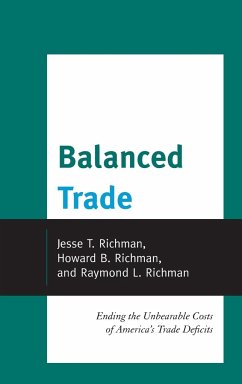How should a principled nation which believes in the benefits of mutually beneficial trade respond to the predations of mercantilist trading partners and imbalanced trade? Many argue that the response should be to do little or nothing. Balanced Trade argues that achieving the full benefits of international trade requires an effective response. Although trade deficits provide short-term gains in consumption, these are combined with long-term losses in consumption, innovation, investment, employment and power. Furthermore, market mechanisms do not correct trade imbalances that result from mercantilism, nor do they compensate for the long term shift in production and consumption towards the mercantilist. Balancing trade can make important short run and long run contributions to economic stability and prosperity. In America today, despite the growing evidence that imbalanced free trade is not working, many American economists remain adamant in their promotion of free trade. They are also quick to label actions taken to balance trade as protectionism. The political system has also failed to effectively address the problem of imbalanced trade, and the Federal Reserve has often exacerbated rather than addressed the challenge. We show that the classical economic arguments against mercantilism do not justify doing nothing. Effectively responding to imbalanced trade and mercantilism requires careful selection of strategy in order to achieve multiple objectives: balancing trade while maintaining the benefits of international trade, avoiding unnecessary inefficiencies, and maintaining compliance with international law. One of the best options is the Scaled Tariff. By targeting countries with which the United States has a large current account deficit, the Scaled Tariff would efficiently, legally, and effectively balance trade. It would be applied to all imported goods from trade surplus countries that have had a sizable trade surplus with the United States over the most recent four economic quarters.The tariff rate would be designed to take in a portion (e.g. 50%) of the bilateral trade deficit (goods plus services) as revenue. No particular product is protected; the scaled tariff simply changes the terms of trade between the two countries, much as currency devaluation would change the terms of trade with all countries.
Hinweis: Dieser Artikel kann nur an eine deutsche Lieferadresse ausgeliefert werden.
Hinweis: Dieser Artikel kann nur an eine deutsche Lieferadresse ausgeliefert werden.








